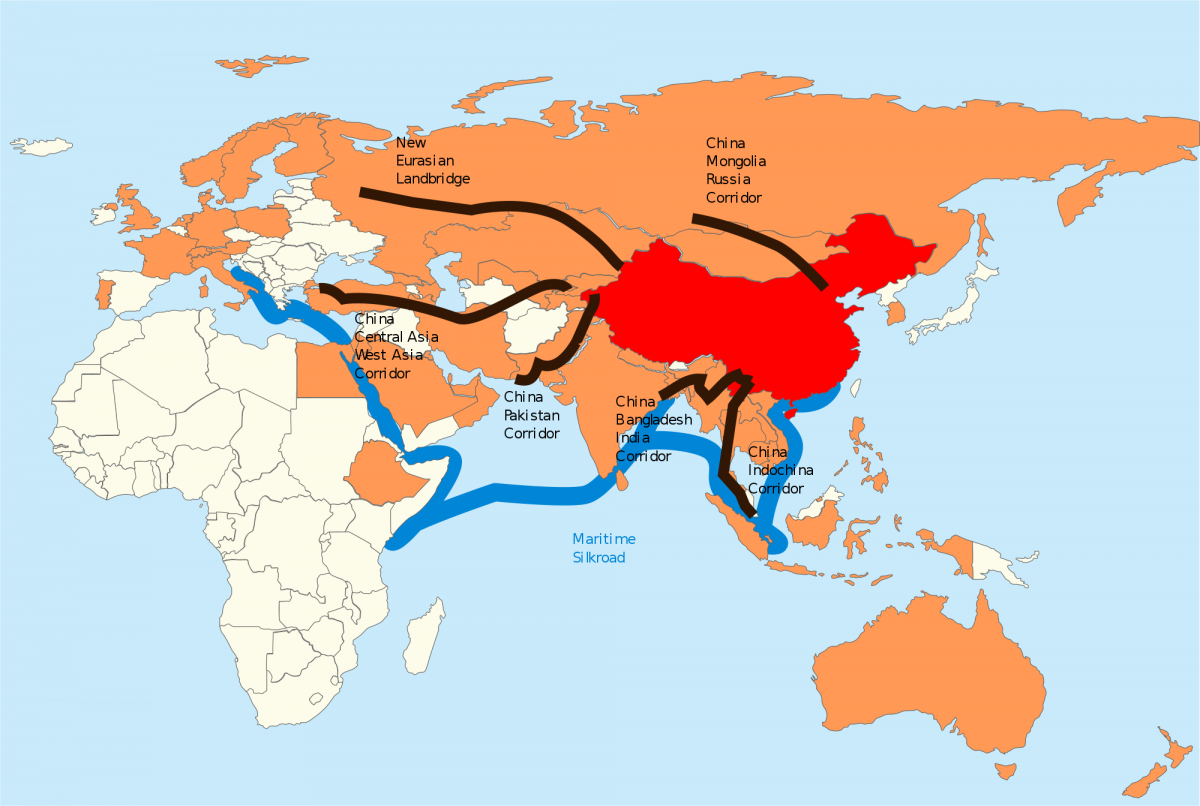Italy to endorse OBOR?
March 7, 2019 | Expert Insights
Italy has planned to sign a memorandum of understanding to become part of China's Belt and Road Initiative, the flagship multi-national, mega-project which is investing billions of dollars in infrastructure across South and Central Asia.
Background
The Belt and Road initiative is a development strategy adopted by the Chinese government involving infrastructure development and investments in countries in Europe, Asia and Africa. It was originally announced by the Chairman of the People Republic of China Xi Jinping during his official visit to Indonesia and Kazakhstan in 2013. "Belt" refers to the overland routes for road and rail transportation, called "the Silk Road Economic Belt"; whereas "road" refers to the sea routes, or the 21st Century Maritime Silk Road. Until 2016, the initiative was officially known in English as the One Belt and One Road initiative but the official name was changed as the Chinese government considered the emphasis on the word "one" prone to misinterpretation.
The Chinese government calls the initiative "a bid to enhance regional connectivity and embrace a brighter future". Some observers see it as a push for Chinese dominance in global affairs with a China-centered trading network.

Analysis
Italy is preparing to become the first G7 country to formally endorse China’s controversial Belt and Road global investment drive, in a move that has drawn a sharp response from the White House and is likely to cause alarm in Brussels.
Michele Geraci, undersecretary in the economic development ministry, told the Financial Times that Rome planned to sign a memorandum of understanding to support the contentious infrastructure programme by the end of March during a visit by Chinese President Xi Jinping to Italy. “The negotiation is not over yet, but it is possible that it will be concluded in time for [Xi’s] visit,” Mr. Geraci said in an interview. “We want to make sure that ‘Made in Italy’ products can have more success in terms of export volume to China, which is the fastest-growing market in the world.”
The move, however, has drawn a critical reaction from the White House, which said the project was unlikely to help Italy economically and could significantly damage the country’s international image. “We view BRI as a ‘made by China, for China’ initiative,” Garrett Marquis, White House National Security Council spokesperson, told the FT. “We are sceptical that the Italian government’s endorsement will bring any sustained economic benefits to the Italian people, and it may end up harming Italy’s global reputation in the long run.”
Mr. Marquis added that US officials had raised concerns about what he called the negative effects of “China’s infrastructure diplomacy”, and urged “all allies and partners, including Italy, to press China to bring its global investment efforts into line with accepted international standards and best practices”.
Italy’s support for China’s BRI initiative would undercut US pressure on China over trade and would undermine Brussels’ efforts to overcome divisions within the EU over the best approach to deal with Chinese investments. Italy is a founding member of the EU.
Mr. Xi is due to arrive in Italy on March 22 on his first visit as president. He is scheduled to his meet Sergio Mattarella, the Italian president, and attend a state dinner that night, according to the Italian president’s office. The Chinese leader is also expected to meet Giuseppe Conte, Italy’s prime minister, and attend a military ceremony before travelling to Sicily. The visit would immediately follow an EU gathering on March 21 in Brussels during which EU member states intend to debate developing a common approach to Chinese investments into the bloc. A separate summit in the Belgian capital with representatives from Beijing is scheduled to take place on April 9, 2019.
Assessment
Our assessment is that Italy’s decision to endorse the OBOR is a major setback for the US’ counter-OBOR program for development in Asia. We believe that the decision of a major NATO member country to formally sign a MoU endorsing and possibly joining the development program is going to impact the US-Japan-Australia development fund for South East Asia.
Read more:
Image Courtesy: Chmee2 (https://commons.wikimedia.org/wiki/File:Chinese_flag_on_the_building_of_Chinese_Embassy_in_the_Portland_Palace_in_London,_June_2013.jpg), „Chinese flag on the building of Chinese Embassy in the Portland Palace in London, June 2013“, https://creativecommons.org/licenses/by-sa/3.0/legalcode








Comments